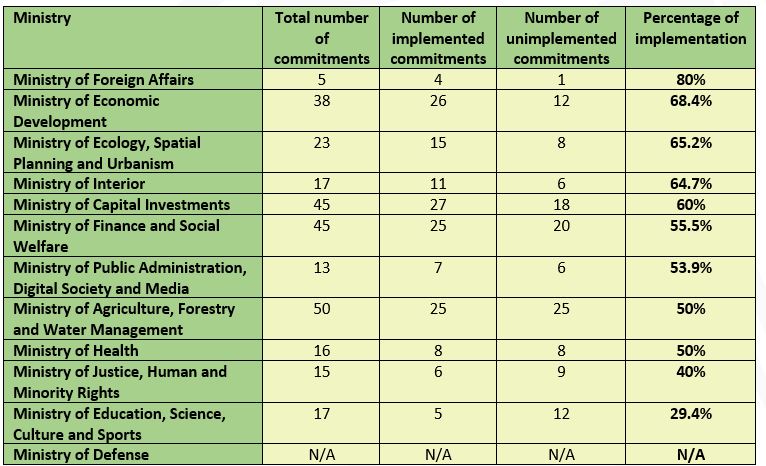Centre for Civic Education (CCE) points out that now, after the EC Montenegro 2021 Report, but also numerous other assessments of relevant actors, the Government Report on the Implementation of the Programme of Accession of Montenegro to the European Union 2021-2023, for 2021, adopted on Government Session on 26 January 2022 confirms that European integration was not a priority for this Government, which is illustrated by the very limited effects of ministries in all parameters when it comes to fulfilling obligations on the path to the EU.
The results of the analysis of the degree of efficiency, i.e. the percentage of (un)implemented commitments in each chapter are an indicator of neglect of key negotiating chapters with the EU, and there are chapters in which no commitments at all have been realized. Out of a total of 284 obligations in 2021, 159, or 56%, were fulfilled. Furthermore, out of 76 strategic documents, 45 or 59% were done, and when it comes to laws and bylaws, the percentage of implementation is 55%, ie 114 out of the planned 208 obligations were realized. The CCE emphasizes that this percentage had to be higher and the obligations had to be done more promptly and efficiently.
When it comes to the overall level of implementation of commitments of individual institutions, the most efficient was the Ministry of Foreign Affairs (with the performance of 80%), followed by the Ministry of Economic Development (68.42%), the Ministry of Ecology, Spatial Planning and Urbanism (65.22%) and the Ministry of Interior (64.71%), while at the back are the Ministry of Justice, Human and Minority Rights (40%), as well as the Ministry of Education, Science, Culture and Sports (only 29.41%), which failed the most. The report states that the Ministry of Defense had no obligations in this framework.
It should be noted that the number of commitments varies between ministries, but this does not affect the accountability of the competent ministers for implementation, and there is an obvious discrepancy in their commitment to this work. This, although without mentioning individual ministries, was also pointed out by the European Commission in its Report. Even then, the CCE representatives assessed that the Ministry of Education, Science, Culture and Sports and the Ministry of Justice, Human and Minority Rights were the most problematic, which is now officially confirmed.
When it comes to the strategic framework, most of the commitments were made by the Directorate for Food Safety, Veterinary and Phytosanitary Affairs and the Ministry of Justice, Human and Minority Rights, with 100% of performance, followed by the Ministry of Capital Investments (87.5%), the Ministry of Economic Development (83.3%) and the Ministry of Interior (83.3%). On the other hand, the Ministry of Health, the Ministry of Agriculture, Forestry and Water Management, as well as the Revenue and Customs Administration have not fulfilled any of the envisaged obligations.
The Central Bank of Montenegro (100%), the Civil Aviation Agency (88.9%) and the Ministry of Foreign Affairs (80%) achieved the best performance in terms of laws and bylaws. On the contrary, in terms of performance, the worst are the Ministry of Education, Science, Culture and Sports (33.3%), the Ministry of Agriculture, Forestry and Water Management (9%) and the Ministry of Justice, Human and Minority Rights (0%).
The Report also deals with the implementation of activities by negotiating chapters. These data indicate that most activities were implemented in chapters 3 (Right of establishment and freedom to provide services), 5 (Public procurement), 6 (Company law), 18 (Statistics), and 33 (Financial and budgetary provisions) where the effect is 100%, followed by chapters 4 (Free Movement of Capital) with 85%, then 2 (Freedom of Movement for Workers) with 83% and 30 (External Relations) with 80%. On the other hand, a worryingly low number of activities was implemented in chapters 26 (Education and Culture) – only 23.08% and 29 (Customs Union) – 25%, while no planned activities were implemented in chapters 7 (Intellectual Property Rights), 11 (Agriculture and rural development), and 22 (Regional Policy and Coordination of Structural Instruments).
Also, in the context of the implementation of commitments, the situation is not satisfactory in the key negotiation chapters 23 and 24. Thus, in Chapter 24 (Justice, Freedom and Security), out of 21, 13 commitments were implemented (7 from the strategic and 6 from the legislative framework) or 61.9 %, and in Chapter 23 (Judiciary and Fundamental Rights) only 9 out of 22 activities (8 from the strategic and 1 from the legislative framework), i.e. 41% of the performance is recorded.
CCE assesses that these indicators are warning and that maximum efforts must be made urgently to unblock the process of European integration, which requires professional and dedicated work on the implementation of commitments. Only in this way can we await the next report on the performance of commitments undertaken on the path to the EU with the significantly smaller number of unfinished homework.
Milica Zindović, Programme Associate

